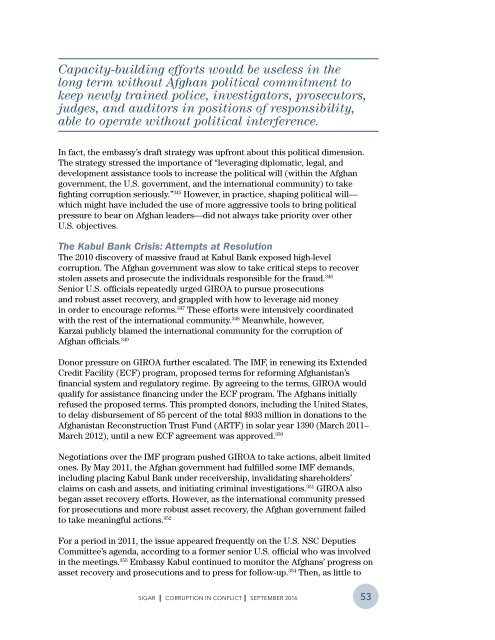CORRUPTION IN CONFLICT
5IlaWjQej
5IlaWjQej
Create successful ePaper yourself
Turn your PDF publications into a flip-book with our unique Google optimized e-Paper software.
Capacity-building efforts would be useless in the<br />
long term without Afghan political commitment to<br />
keep newly trained police, investigators, prosecutors,<br />
judges, and auditors in positions of responsibility,<br />
able to operate without political interference.<br />
In fact, the embassy’s draft strategy was upfront about this political dimension.<br />
The strategy stressed the importance of “leveraging diplomatic, legal, and<br />
development assistance tools to increase the political will (within the Afghan<br />
government, the U.S. government, and the international community) to take<br />
fighting corruption seriously.” 345 However, in practice, shaping political will—<br />
which might have included the use of more aggressive tools to bring political<br />
pressure to bear on Afghan leaders—did not always take priority over other<br />
U.S. objectives.<br />
The Kabul Bank Crisis: Attempts at Resolution<br />
The 2010 discovery of massive fraud at Kabul Bank exposed high-level<br />
corruption. The Afghan government was slow to take critical steps to recover<br />
stolen assets and prosecute the individuals responsible for the fraud. 346<br />
Senior U.S. officials repeatedly urged GIROA to pursue prosecutions<br />
and robust asset recovery, and grappled with how to leverage aid money<br />
in order to encourage reforms. 347 These efforts were intensively coordinated<br />
with the rest of the international community. 348 Meanwhile, however,<br />
Karzai publicly blamed the international community for the corruption of<br />
Afghan officials. 349<br />
Donor pressure on GIROA further escalated. The IMF, in renewing its Extended<br />
Credit Facility (ECF) program, proposed terms for reforming Afghanistan’s<br />
financial system and regulatory regime. By agreeing to the terms, GIROA would<br />
qualify for assistance financing under the ECF program. The Afghans initially<br />
refused the proposed terms. This prompted donors, including the United States,<br />
to delay disbursement of 85 percent of the total $933 million in donations to the<br />
Afghanistan Reconstruction Trust Fund (ARTF) in solar year 1390 (March 2011–<br />
March 2012), until a new ECF agreement was approved. 350<br />
Negotiations over the IMF program pushed GIROA to take actions, albeit limited<br />
ones. By May 2011, the Afghan government had fulfilled some IMF demands,<br />
including placing Kabul Bank under receivership, invalidating shareholders’<br />
claims on cash and assets, and initiating criminal investigations. 351 GIROA also<br />
began asset recovery efforts. However, as the international community pressed<br />
for prosecutions and more robust asset recovery, the Afghan government failed<br />
to take meaningful actions. 352<br />
For a period in 2011, the issue appeared frequently on the U.S. NSC Deputies<br />
Committee’s agenda, according to a former senior U.S. official who was involved<br />
in the meetings. 353 Embassy Kabul continued to monitor the Afghans’ progress on<br />
asset recovery and prosecutions and to press for follow-up. 354 Then, as little to<br />
SIGAR I <strong>CORRUPTION</strong> <strong>IN</strong> <strong>CONFLICT</strong> I SEPTEMBER 2016<br />
53


